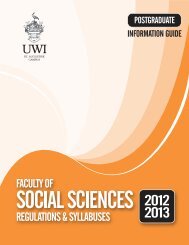Faculty of Humanities and Education (Postgraduate) - The University ...
Faculty of Humanities and Education (Postgraduate) - The University ...
Faculty of Humanities and Education (Postgraduate) - The University ...
You also want an ePaper? Increase the reach of your titles
YUMPU automatically turns print PDFs into web optimized ePapers that Google loves.
118<br />
POSTGRADUATE REGULATIONS & SYLLABUSES 2012 - 2013<br />
THE FACULTY OF HUMANITIES & EDUCATION<br />
No longer will administrators in our educational system operate<br />
from a position <strong>of</strong> limited knowledge, skills, <strong>and</strong> competencies<br />
derived from a perspective <strong>of</strong> passive observers <strong>of</strong> the system.<br />
Deliberate <strong>and</strong> continuous efforts at developing state-<strong>of</strong>-the-art<br />
practice, strategies, <strong>and</strong> personal theories must be a prerequisite<br />
for increasing efficiency <strong>and</strong> effectiveness both at the macro<br />
<strong>and</strong> micro levels <strong>of</strong> the system. It is therefore envisaged that<br />
participants in this course will develop these competencies<br />
in a learning environment <strong>of</strong> active engagement/interaction,<br />
simulations, <strong>and</strong> role-play, while immersed in relevant <strong>and</strong><br />
current literature in the field <strong>of</strong> organization <strong>and</strong> administration<br />
theories <strong>and</strong> reflective practice.<br />
OBJECTIVES<br />
Students will:<br />
1. demonstrate a new underst<strong>and</strong>ing <strong>of</strong> the role <strong>of</strong> all<br />
stakeholders in education in general but Trinidad <strong>and</strong><br />
Tobago in particular;<br />
2. survey guiding sets <strong>of</strong> values, ideologies, <strong>and</strong> philosophies<br />
that will undergird the practice <strong>of</strong> the new administrator;<br />
3. diagnose <strong>and</strong> analyse the global environment in more<br />
creative ways to ensure greater adaptability <strong>and</strong> relevance<br />
<strong>of</strong> the educational enterprise;<br />
4. capture <strong>and</strong> contextualise essential elements/principles<br />
embedded in traditional <strong>and</strong> contemporary organisational<br />
<strong>and</strong> administration theories;<br />
5. reconceptualise traditional organisational designs to meet<br />
the needs <strong>of</strong> a transformed educational experience;<br />
6. provide the critical mass necessary for redefining the<br />
instructional technologies <strong>of</strong> the teacher <strong>and</strong> student <strong>of</strong><br />
the future;<br />
7. constructively engage colleagues in devising new <strong>and</strong><br />
meaningful menus <strong>of</strong> motivational <strong>and</strong> technological<br />
strategies for all levels <strong>of</strong> the educational system.<br />
CONTENT<br />
This course is divided into five modules. Each module provides<br />
student-administrators with different but complementary<br />
experiences, combined in specific ways to allow for creativity,<br />
collaboration, <strong>and</strong> individuation. <strong>The</strong> content <strong>of</strong> each module<br />
will be analyzed <strong>and</strong> reinterpreted to address the special<br />
circumstances <strong>and</strong> imperatives <strong>of</strong> school improvement <strong>and</strong><br />
empowerment <strong>of</strong> administrators, teachers, <strong>and</strong> other school<br />
personnel. <strong>The</strong> modules are described in the following section.<br />
Module 1 - <strong>The</strong> Prismatic Construct - emphasis on surfacing<br />
key antecedent factors that will provide the critical mass in<br />
determining administrators’ideological <strong>and</strong> philosophical bases<br />
key to the restructuring process; educational ethics dimensions<br />
<strong>of</strong> ethics, the nature <strong>of</strong> values, moral dilemmas, multiculturalism,<br />
bases <strong>of</strong> ethics (e.g., revelation, utilitarianism, existentialism,<br />
naturalism). Moral responsibility <strong>of</strong> administrators.<br />
Module 2 - <strong>The</strong> emergence <strong>of</strong> organizational <strong>and</strong> administration<br />
thought classical/traditional, human relations, behavioural,<br />
systems, socio-technical, contingency theories; Organizational<br />
designs the basic elements or dimensions <strong>of</strong> organizational<br />
design including classical, systems, contingency <strong>and</strong><br />
other contemporary approaches to organizational design;<br />
Organizational structures in schools formal <strong>and</strong> informal<br />
structures.<br />
Module 3 - Job design historical development <strong>of</strong> job design<br />
strategies; job specialization, enlargement, rotation, enrichment,<br />
redesign <strong>of</strong> the job characteristics, with special application<br />
to education; <strong>The</strong> relationship between job design <strong>and</strong><br />
organization design in the context <strong>of</strong> school administration; Key<br />
administrative functions.<br />
Module 4 - Socialization <strong>and</strong> pr<strong>of</strong>essional development<br />
strategies, orientation programmes, organizational <strong>and</strong><br />
individual needs assessment strategies, staff development<br />
approaches (on-the-job or <strong>of</strong>f-the-job); Climate <strong>and</strong> culture<br />
<strong>of</strong> schools, levels <strong>of</strong> culture (shared norms, shared values, tacit<br />
assumptions); School climate healthy <strong>and</strong> unhealthy, custodial,<br />
humanist, open, close engaged, disengaged implication for<br />
school improvement; Culture-changing strategies.<br />
Module 5 - Organizational conflict nature <strong>of</strong> conflict, sources<br />
<strong>of</strong> conflict, effects <strong>of</strong> organizational conflicts, the dynamic <strong>of</strong><br />
organizational conflict, different views <strong>of</strong> conflict (contingency,<br />
process, structural, open systems), diagnosing conflict resolution<br />
strategies; Organizational self-renewal <strong>and</strong> development use <strong>of</strong><br />
force field analysis, OSN Model; Motivation the extrinsic-intrinsic<br />
debate, content, process, <strong>and</strong> reinforcement theories.<br />
Methods <strong>of</strong> Delivery<br />
<strong>The</strong> delivery <strong>of</strong> this course will focus on creating a cadre <strong>of</strong><br />
administrators who will view schools as learning organizations,<br />
characterized by dynamism <strong>and</strong> continuous search for meaning,<br />
relevance, <strong>and</strong> excellence. A wide range <strong>of</strong> instructional<br />
methodologies will be employed lectures, group discussions, oral<br />
presentations, individual projects, case studies, <strong>and</strong> simulations<br />
with the specific intent <strong>of</strong> allowing for intense interaction as<br />
well as opportunities for individual scholarship.<br />
ASSESSMENT<br />
Students will be assessed on the basis <strong>of</strong> written papers. All<br />
papers will test students’ underst<strong>and</strong>ings <strong>of</strong>, <strong>and</strong> abilities to<br />
apply, organizational <strong>and</strong> administration theories <strong>and</strong> concepts<br />
to the realities <strong>of</strong> the educational system in general, <strong>and</strong> their<br />
schools in particular.<br />
Each module will be tested by the production <strong>of</strong> a paper <strong>of</strong><br />
2,500 words, which will become due no later than two weeks<br />
after the end <strong>of</strong> the particular module. <strong>The</strong> four best marks will<br />
be selected to constitute 40% <strong>of</strong> the final mark.<br />
<strong>The</strong> final assignment will assess each student’s underst<strong>and</strong>ings<br />
<strong>of</strong> organizational <strong>and</strong> administration theories <strong>and</strong> concepts<br />
in an effort to remediate/resolve an organizational problem/<br />
issue in his/her school. <strong>The</strong> final assignment <strong>of</strong> 5,000 words will<br />
constitute 60% <strong>of</strong> the final mark.

















